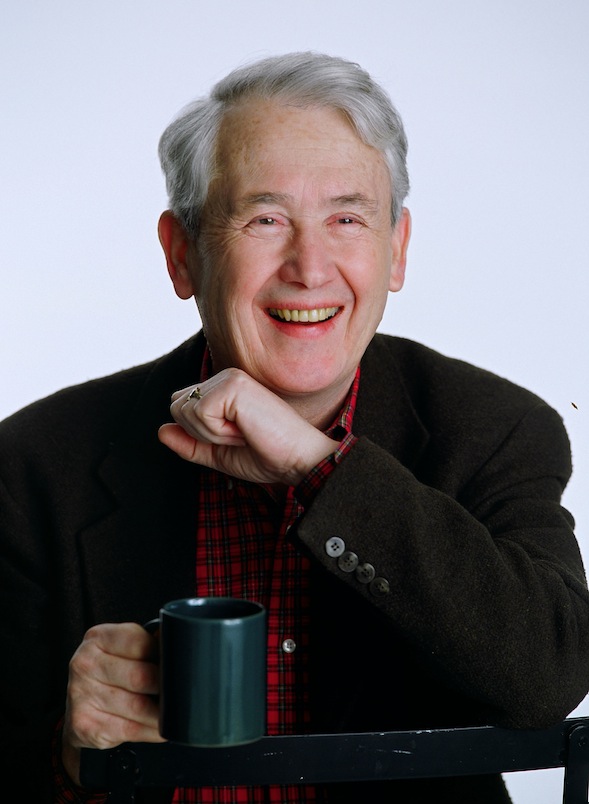Editor’s Note: Frank wrote this piece for Irish America’s 20th anniversary issue. It was reprinted in memorium of Frank McCourt and his invaluable contributions to Irish American literature.
Jim Sheridan came over to my table at the Lion’s Head bar and asked if I’d be interested in acting in a new play by a young man from Belfast, Terry George. Jim was artistic director at the Irish Arts Center and I knew him from my time performing A Couple of Blaguards there with my brother Malachy. The play, The Tunnel, was about a group of IRA prisoners trying to escape from a Long Kesh type of jail in the North.
I never thought of myself as an actor but my teaching career was winding down and this might be the start of another life. Of the eight men on stage I’d surely be spotted by the critics and lured to Broadway. Next stop: Hollywood and a role opposite Sharon Stone. My seven fellow-actors would dribble with envy but that’s the way of the world. Talent will out.
I played the part of Scowler, IRA veteran and oldest man in the group. I had good moments on stage with Nye Heron, director of the Center. When I worked with him I could never forget that he was a descendant of James Connolly, the one I admired most of the men executed in 1916.
So here I was, teacher by day, actor by night, and thinking more and more of the similarities and differences between the two.
I learned long before that acting doesn’t work in the classroom. You can try it for a while but then the kids catch on to you and, if acting is a mask, you’d better take it off. Now I was learning that acting doesn’t work on the stage either. I would watch Nye Heron or Ciaran O’Reilly at work and realize that less is more. Strong emotions can be expressed quietly and you don’t have to flap your arms.
Sometimes in teaching you have to raise your voice, go over the top. You’re driven to it, especially when you’re inexperienced. You have to get and keep the attention of thirty-odd New York teenagers and you’ll resort to anything. I sang and chanted and told them if they didn’t pay attention I’d do a nude soft shoe. “No, no,” they begged. “Anything but that.” Let us graduate with our image of you intact: handsome, charming, and intelligent.
You’re on your own in the classroom. There they are and there is no escape. Every day you are appraised, sized up, checked out. They’ll find your weaknesses. They’re like heat-seeking missiles. It is your one unit of energy up against thirty-five of theirs. They have tricks and strategies to divert you from the lesson, to challenge you while you’re teaching. You teach your lesson. The bell rings, no applause, and they can’t wait to get out of the room.
When they’ve left you wonder what you’ve done to them or for them. You only know what they’ve done to you or for you. In The Tunnel you’re on stage with seven men. Off stage is a narrow space behind the set where you dress and wait for your next scene. If you miss a cue or drop a line you are punched enthusiastically where the bruises will not show.
You don’t have to worry about the audience. The play is so popular the house is packed, so popular that Paul O’Dwyer, one of New York’s most revered politicians, could not get a seat one day, so popular that John Houseman came to see us and I’m sure he couldn’t take his eyes off me.
The theater audience will meet you more than half way. They’ve paid their admission and they want to be moved and entertained. You don’t have to stand there like a high school teacher and warn them about low grades or failure itself. Just get up there, act your part, remember this is a team effort, take your bow, relish the applause and notice how all eyes are on you, not on Nye or Jim or Ciaran or the rest.
You tell your high school students about your acting career and some come to see you out of curiosity. They love it. Man, there’s our teacher up there, all tough in his black knitted cap, our teacher the IRA gunman in jail for a thousand years, our teacher digging a tunnel with all those other tough Irishmen. “Gawd, Mr. McCourt, isn’t it great to be Irish.”
It was just starting, the world’s new type of love affair with the Irish. We were still a charming, hospitable people drinking our pint over there on that sweet little green island where leprechauns and Barry Fitzgeralds abounded. We were poor and priest-ridden, romantic, always reciting poetry and loved by tourists. Irish plays and films drew worn adjectives: charming and lyrical.
In Terry George’s play there was no charm and little lyricism. It was tough and hard and if we sang a song or two, well, you had to pass the time somehow. Still my students loved seeing the teacher up there being so Irish. Oh man, all those brogues. They wanted to know more about the IRA and Ireland and my father who was an IRA man.
But a new Ireland was emerging and it had different faces: Pierce Brosnan, U2, Liam Neeson, Seamus Heaney. To Americans the new Ireland was “sexy,” and how much higher can you go on the scale of praise?
It’s a long way from Stuyvesant High School on East 15th Street to the Irish Arts Center on West 51st Street, but in my five months on the stage the route became a tunnel.
Jim Sheridan and Terry George went on to become acclaimed writers and directors, and I left teaching and wrote a book.


Leave a Reply